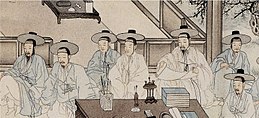
Back تراث شعبي كوري Arabic Koreya folkloru Azerbaijani কোরীয় লোককাহিনি Bengali/Bangla Կորեական ֆոլկլոր Armenian Folklor Korea ID Folclore coreano Italian 한국 민속 Korean Tradisyong-pambayang Koreano Tagalog
 |
| Part of a series on the |
| Culture of Korea |
|---|
| Society |
| Arts and literature |
| Other |
| Symbols |
|
Stories and practices that are considered part of Korean folklore go back several thousand years. These tales derive from a variety of origins, including Korean Shamanism, Confucianism, Buddhism, and more recently Christianity.
Many folk traditions developed in rural areas such as villages. They often relate to households and farming, and reinforce family and communal bonds. The performance of folk tales reflects this, with performers often encouraging and eliciting audience involvement. Traditions and stories were passed down orally, although written examples appear beginning in the 5th century.
While many traditions have become less practiced or modernized, folklore remains deeply embedded in Korean society, continuing to influence fields such as religion, stories, art, and customs.